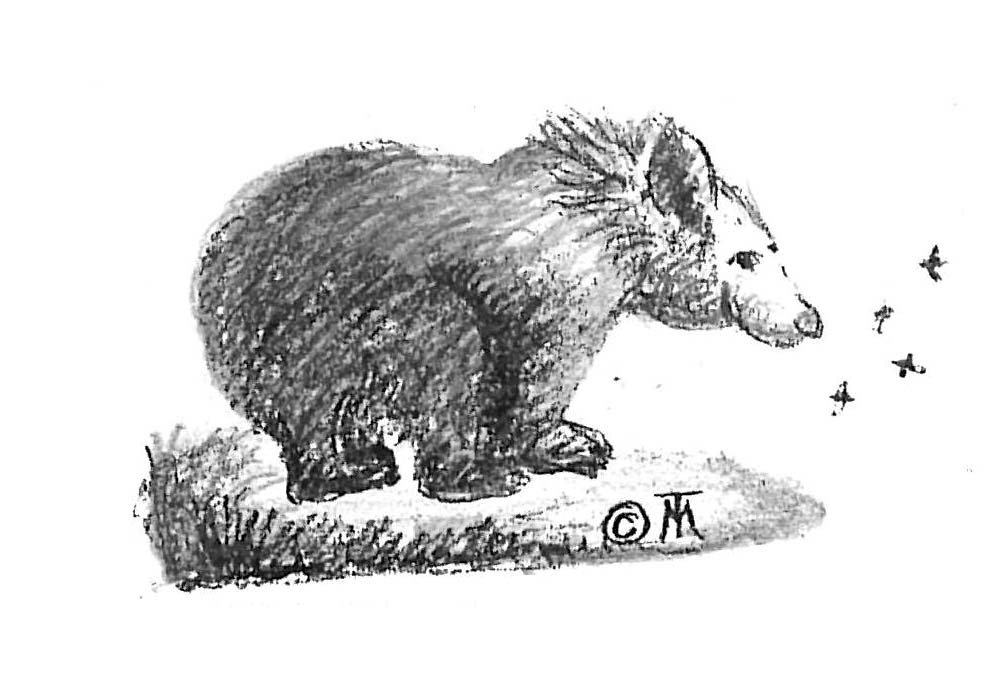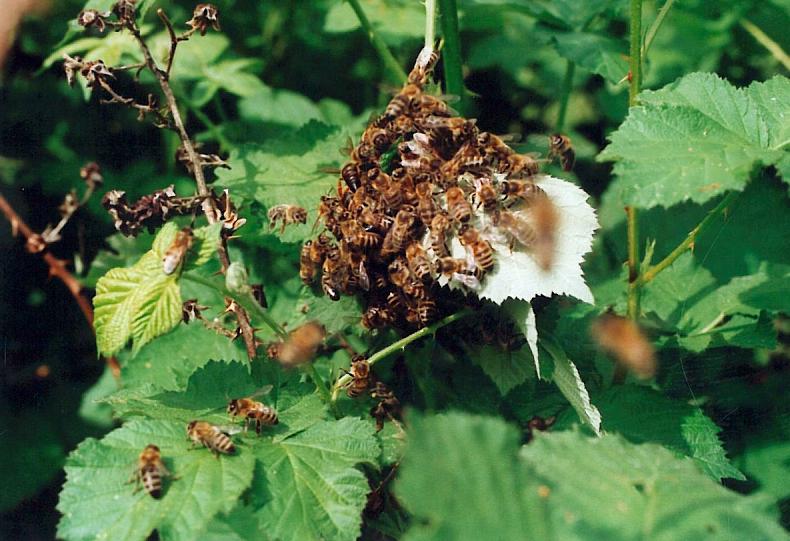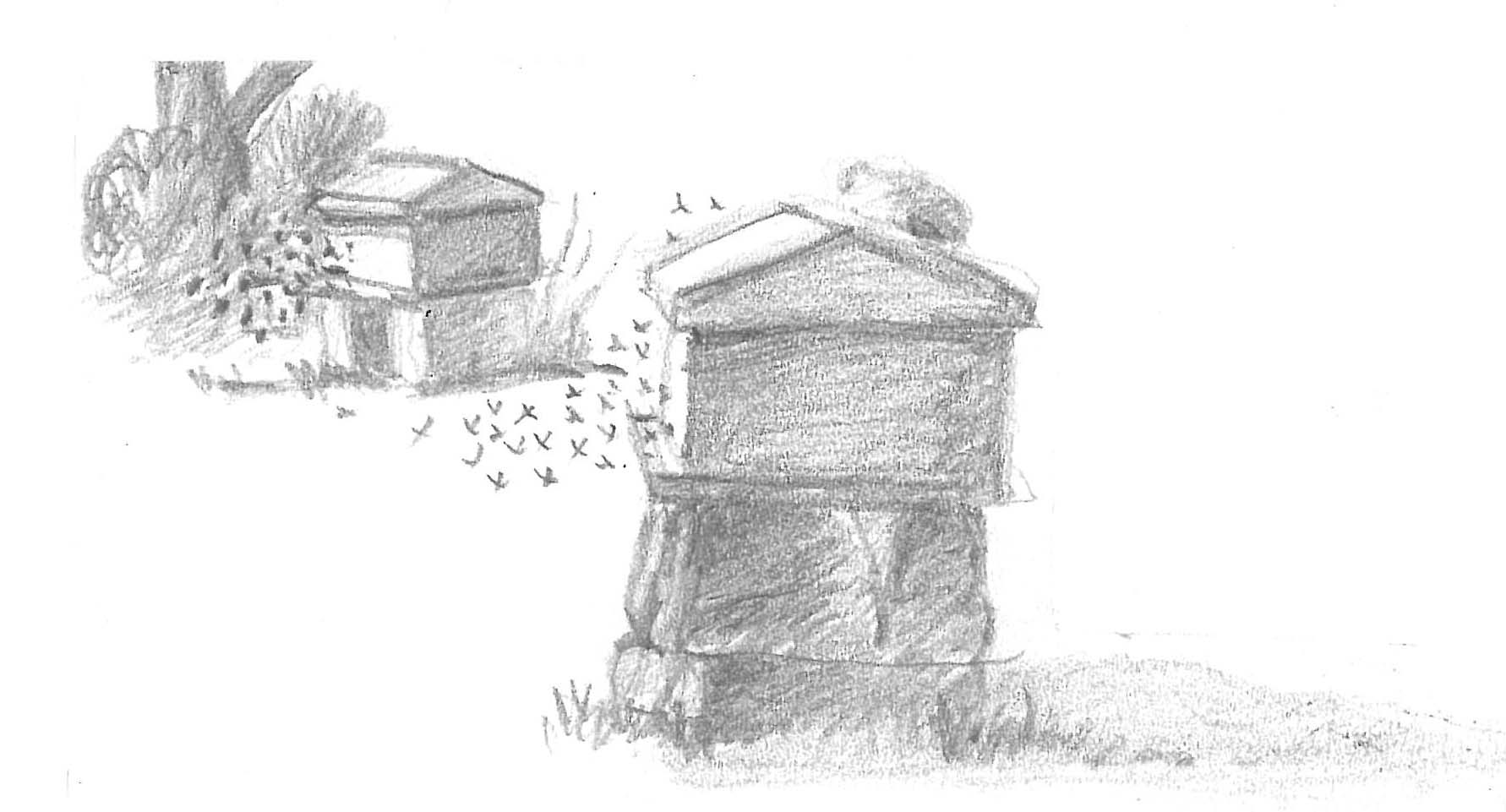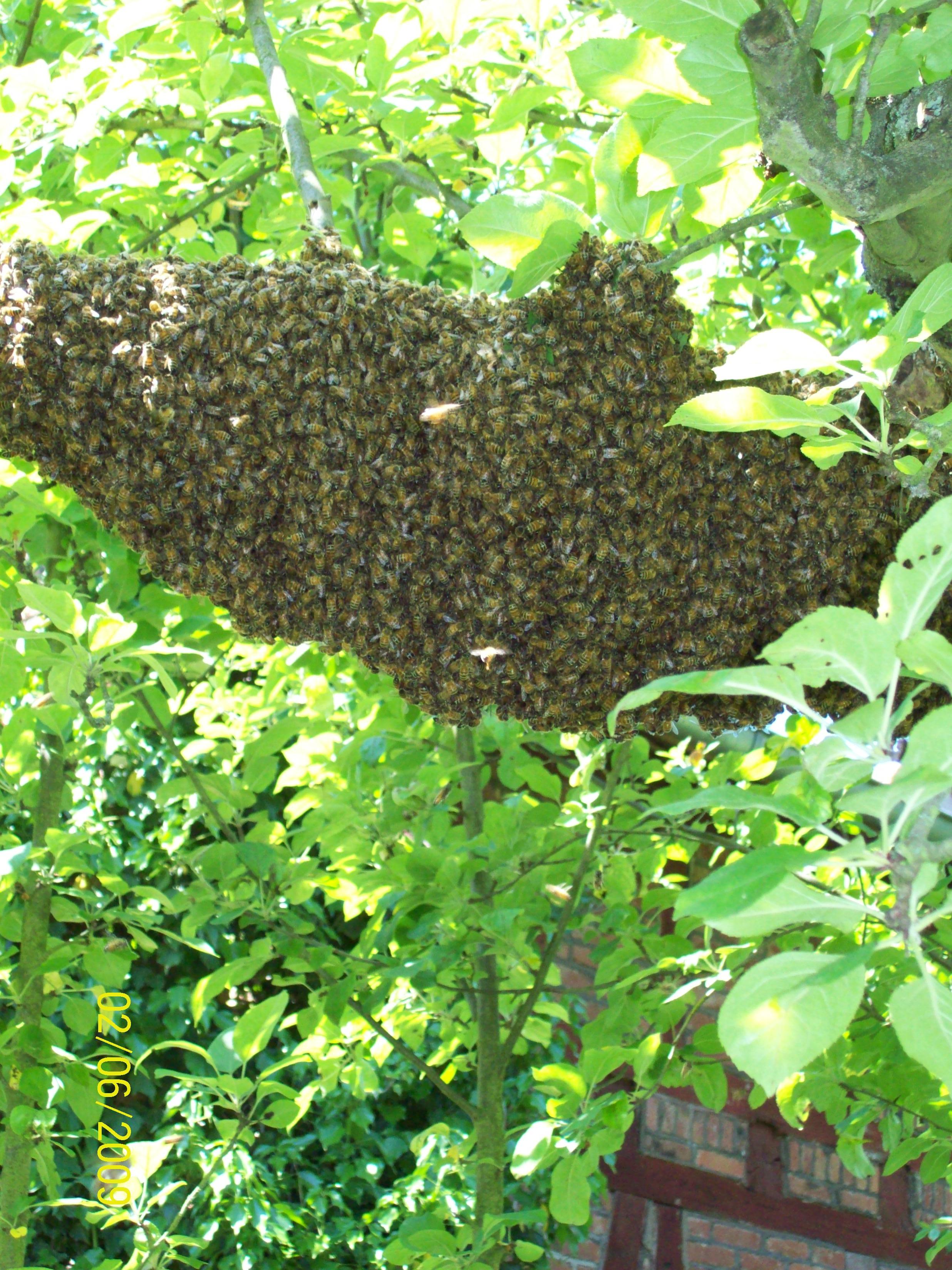



Sign
up for bee-therapy | Beauty-cure
| Anti-aging | Infertility
| Cancer
of the breast | Hashimoto-Thyreoiditis
|
Crohn's disease
Rheumatism
| Juvenile idiopathic
arthritis | Heart
diseases | Arteriosklerosis
| MS |
Diabetes
| Neurodermitis
| Obesity |
Depression
and Psychosis
Allergies
| Alzheimer
/ Parkinson | Diseases
of the kidneys | Pancreas
| how
to improve fitness of the body
Propolis
| Beeswax | Royal
Jelly | Organic Honey |
Comb
in the Comb | Raw Honey
| Organic Beekeeping
Basic Course
Expertise
| Courses | Home
| Research | Save
Beecolonies-Bienenpatenschaft | Certification
| Training Apitherapy
Letters On Organic Beekeeping
And More... Part I
(selected letters)
Second
Letter - Normal Organic Standards
2000
November 29
My dear friends
of natural beekeeping,
I hope this letter is not altogether too boring; my previous letter
surely was more interesting. Anyway we need to discuss a small leaflet
which can give much boredom, in case you don't have boredom. It is: "Organic
Honey Standards - An example from Quality Assurance International".
"While pedigree of the bees is not crucial to organic honey production,
their handling in a manner that prevents contamination of future organic
honey crops with residual honey or bee feed from non- compliant sources
is crucial" (1).
QAI does not care so much about the bees. More important is the honey
and the handling of bees to obtain organic honey. The bees may be degenerated
as can be, if they only are able to collect some nectar in order to produce
the QAI certified organic honey.
"Each bee-keeper is required to have a supplemental feeding plan, if
starvation is imminent. This would include planning for sources of honey,
sugar, syrup, fruit concentrate or other food source for non-flow periods"
(1).
The supplemental feeding plan is important; you may feed fruit concentrates
and whatever you want, it is less important. I suppose QAI never got to
know about food suitable for bees (2).
"The use of non-compliant feed supplements during honey flow is prohibited"
(1).
After the honey-flow everything seems to be allowed.
"Beekeepers are allowed to use the antibiotic oxytetracyclin (terramycin)
as a preventive measure against the spread of American Foulbrood into colonies.
Antibiotic applications may be made only after the end of honey production,
and must be terminated 30 days prior to the start of new organic honey
production" (1).
Quality Assurance International is telling us that they are "a private,
professional service corporation developed specifically for the purpose
of verifying the authenticity of food." I suppose we need to believe them
that they have worked very hard on developing these organic standards,
but they will be so kind to believe us that they didn't succeed in it.
"Beekeepers are allowed to use the antibiotic oxytetracyclin (terramycin)
as a preventive measure" Regarding this sentence QAI is not even the shadow
of a certifier for organic beekeeping; not to mention organic standards
that take care of bees kept naturally according their needs (2), not to
mention the idea old teachers have gotten on natural beekeeping (3).
"Use of wet comb (extracted, but wet with honey) from conventional hives
is prohibited" (1).
The use of dry combs from conventional hives is allowed? You have the
residuals from antivarroa in dry combs as well as in wet combs. QAI's mistake
is not thinking in a wrong way but simply thinking not at all.
"Any honey heated to over 110 degrees F must not be labelled "raw" honey
because of heat denaturing of enzymes" (1). I fall out of all clouds! I
really didn't know that they know so much about contents of honey!
"Yard records of all inputs must be maintained, including dates and
amounts of materials applied. A detailed production log with an apiary
yard location system must be maintained in an auditable format" (1).
QAI is teaching us not very much but despite of this we can learn very
much from "Organic Honey Standards - An example from Quality Assurance
International". We are allowed to be in doubt about all what they say and
may carry on inquiring. Where did we stop? - the "auditable format". "Yard
records of all inputs must be maintained, including dates and amounts of
materials applied ... in an auditable format". In case there is nothing
important to tell, it must be at least put into a nice form: nice records
and a fine auditable format.
Anyway, now I should almost give QAI a full apology. Quality Assurance
International is not worse than all the other; and when being unreasonable
or absurd in society, apologizes the nonsense, so QAI is adequate apologized.
Notes
-
QAI (2000): Organic Honey Standards - An example from Quality Assurance
International.
-
Thiele, M. (2000): Organic Beekeeping Internet Courses I. TCS-standards
2000. On criticism regarding modern ways of beekeeping. Bad Sooden/Germany.
-
Thiele, M. (2000): Organic Beekeeping Internet Courses IV. Bee-philosophy.
Bad Sooden/Germany.
Third
Letter - Varroa Resistance
2000
December 1
As you know,
many scientists and beekeepers maintain, varroa resistance is something
that can be bred for. You can find articles on it, scientific research,
speeches, discussions, so many that you start yawning. So I will not list
all scientific research, but I will concentrate on the way how it is carried
out.
To show that only young scientists like Mr. Kirsch (1) are wrong, would
seem to be an easy as well as unnecessary work. It is something different,
if he is wrong together with the whole herd. In that case he is not the
bleating sheep in the rear but it is the herd, which gives him the direction.
So the research of Mr. Kirsch can be taken as an example how scientific
research is carried out in this matter.
He is just talking hot air, when Mr. Kirsch assures: "The results shows
spectacular, that all efforts has been worthwhile". He calls his work extraordinary
decisive ("something we see clearer now"), and absolutely nothing crucial
follows, except that "further profitable work is going to follow" - - because
he gets the funds from government. This is also the reason why he doesn't
become tired of telling: "This is of course a challenge of further and
first of all long-lasting research". But referring to the incredible results:
I don't know what is the bigger poorness, calling the Uruguay-bee an unknown
bee, or proclaiming a varroa-tolerance in this bee that can be bred for
also in other countries.
Did you ever hear that a bee with varroa-tolerance doesn't loose its
tolerance very soon again, if the surroundings changes? No word! (2,3).
How cross-eyed it is, to express himself in a way, making this, through
which a matter becomes reality, to a matter that follows? But the squinting
manner is the true character of Mr. Kirsch's style, and you won't find
it in any men's power, speaking about a matter he doesn't understand, in
an other than a squinting way. If only he speaks in a modest and unpretentious
way, in case he feels himself urged to speak about such a matter! But at
the same time adopting the tone of a man, from whom new discoveries can
be expected in this matter, something like: "the mechanism of varroa-tolerance
until now just shows some promise" or: "Uruguay is similar to an oasis
regarding the production of pure honey, propolis and beeswax - and is an
El Dorado for bee-scientists" (1). If it were the only place in the world!
You can find varroa-tolerant bees in other places of South America like
Argentina, Brazil, in Africa, Russia and Asia. Those places are as well
suitable for organic beekeeping. And in comparison to those countries,
Uruguay is an even more untypical place for organic beekeeping. I discussed
it in my first letter and the first organic beekeeping course (4).
Who else is concerned in respect of breeding for varroa-tolerant bees?
Mr. Koller for instance. He is describing himself as an amateur or even
greenhorn regarding scientific research (5). Maybe his understanding of
a layman is not able to get the real problems in sight. But he is not getting
tired of praying that varroa-tolerance is something that can be bred for,
that can become stabilized. And he is not only praying, he is also grumbling:
"Instead of going to work it out, stabilizing varroa-tolerance, Mr. Liebig
is only asking, if the colonies in those tests has been really free of
varroa and if the previous Apistan-application didn't lead to a kind of
falsification. Completely different the Americans." - Yes Certainly! -
"Meanwhile they are not breeding only for varroa-resistance" - Heaven forbid!
Who is today only breeding for varroa-resistance? The Europeans? The Americans
in any case not - ; "they are breeding also for higher honey yields" (5).
Mr. Koller cannot think it himself, as he should like to, that the Americans
are breeding for higher honey yields; Bernard's Apiaries Inc needed to
tell him personally (5). This was obviously an occasion for Mr. Koller
to find out that this company is the owner of a licence for distributing
Russian queens. Now Mr. Koller get those original russian queens from USA
and is selling them to willing buyer beekeepers. Meanwhile he has a growing
sense of being the only administrator and distributor by the grace of god:
"I am the only one for the time being who is able to distribute queens,
queen cells or maggots from original queens and I feel myself personally
addressed" (5).
If somebody wants to waste his money, he may lavish on buying those
queens. Although a dead queen may be very cheap, for an original imported
queen being alive you have to fork out 1.800 DM (or just peanuts: 500 US
$ when you buy in USA). Why this price, when varroa-tolerance is not guaranteed?
Well, Mr. Koller says: there is always something that is incalculable.
Those incalculability's must be taken into account when calculating the
price" (5).
You mean it is not enough that Mr. Koller is assuring it in good faith?
And if Mr. Kirsch is assuring it in good faith as well? And if Mr. Koller
and Mr. Kirsch and Bernard's apiaries, if they all assure in good faith
that those queens have a long lasting varroa-tolerance (in USA as well
as in Europe)?
I need to finish this letter - I can't even write these last words -
because I am already going off into fits of laughter - I guess the reader
of this letter too, in case he is not fallen asleep in the meantime.
Notes
(1) Rosenkranz, P. & Kirsch, R. (1999): Uruguay - Oase ohne Rückstände.
Varroatose-Toleranz der Bienen in Uruguay, Beginn längerwährender
Untersuchungen. Dbj 5/99.
(2) Liebig, G. (2000): Nachgehakt. Auf der Suche nach den varroaresistenten
Bienen: weshalb in die Ferne schweifen, wenn das Gute liegt so nah? Dbj
11/00.
(3) Böcking, O. (2000): Varroa-Toleranz - wo stehen wir heute?
Dbj 12/00.
(4) Thiele, M. (2000): Organic Beekeeping Internet Courses I. TCS-standards
2000. On criticism regarding modern ways of beekeeping. Bad Sooden/Germany.
(5) Koller, J. (2000): Es gibt viel zu tun, packen wir's an. Dbj 12/00.
Fifth
Letter - On Criticism
2000
December 7
Dear friend
of natural beekeeping,
What kind of letter do you think I have received recently? I receive
many letters, positive as well as negative but this one is really remarkable.
Mr. B. from Germany wrote: "I am seized with horror" and he is accusing
me of libelling other persons. I responded: "You can't mean that seriously!,
Mr. B., you seem to be aquainted with these kind of accusions, thus you
are skilled in libels that are a pure invention. And who preferably wants
to be libelled?" And what was he drivelling about? He drivelled about "foolishness",
"hate" and "smattering of education" and started with a kind of autobiography
or self-portrayal.
I think we let him carry on talking and drivelling; meanwhile we'll
continue with our research, the research on effectivity of criticism. I
will try to find words that fit: all what is going to be criticized, will
be examined very strictly; the starting point are always publications,
no affairs. Maybe we are not all the time polite - anyway a polite criticism
is no criticism but nothing else than simply paying somebody compliments.
This tone of paying compliments is very common in the organic movement.
Not only this Mr. B. has become used to it already. It is something different
to disparage a person instead of analysing his texts, his publications.
We start out from texts and our criticism is well-founded; every satire,
every mockery, every ridicule is allowed. But talking about "hate" (in
order to use one of Mr. B's expressions.), where just satire and mockery
can be found, shows simply the inability to distinguish this.
Self-defence prevents from blowing in one's own trumpet. Therfore I
don't want you to be excluded from reading a letter I recently received
from the scientist Thomas S./USA: "Dear Michael" he wrote, "I really enjoy
your letters on organic beekeeping - even more than the courses, although
you have much more details on organic beekeeping included in these courses.
I like your style and I appreciate your telling of what needs to be told.
You are telling everything in a humorous and satirical way, analysing what
people are writing without glossing over, without trying to make things
seem better; also an effort on covering everything with a smoke screen
or the ability to muddy the waters, or to brew pleasant tranquillizer,
as it is common among critics, I cannot find. But I wonder if you are not
too critical with us. I have in mind the second and third letter; for instance
in the second letter you are telling: 'QAI is not worse than all the other;
and when being unreasonable or absurd in society, apologizes the nonsense,
thus QAI is adequate apologized'. Of course you give the reason for this,
but don't you have organic certifier in Germany? And are they not living
in their own 'society' too? I know, you know it, but you forget it with
purpose.".
The truth is, I don't want to talk about certifier, because it's a boring
matter and I don't want you again falling asleep while reading this letter.
Anyway, one word.
The society of organic certifier in Germany is similar to those in the
USA. All these companies - I can not list them all - went so far in their
neutrality as to give a single regulation or standards more content, and
their authors far more insights, far more reasons, than they ever have
shown, and they let them defend their business much better, as it ever
can be expected from themselves.
It is especially Mr. Grosch, who suddenly make his début with
an idea, which sounds pedantic enough to be thoroughly. Somebody else just
would redicule this idea; I will look into it. Mr. Grosch got the idea
to certify honey and beeproduce just according EEC-Regulation "Organic
Farming"; the organic criteria of this regulation can be easily fulfilled,
as his label "Öko-Garantie" assures it. There is not a lack of beautiful
words, idioms and empty talk, but all his words and hackneyed expressions
regarding organic beekeeping he took away from this regulation. The meaning
of it was too difficult, too heavy, he couldn't take it away as well, thus
he left it where it was. Wait a moment, it will turn out soon.
As I told you, I just don't want to redicule his idea, but to look into
it. - Except, as I almost fear, that it might come down to the same thing.
- But this probably is not my fault. Thus lets get on with it. What is
layed down in this regulation regarding the way of keeping bees naturally
according their needs? Regarding organic breeding methods? We'll have a
look at it:
Below letter C "Beekeeping and Beekeeping products" Council-regulation
(EEC) N° 2092/91 of 24 June 1991 on organic production of agricultural
products and indications referring there to on agricultural products and
foodstuffs (Official Journal L 198 22/07/1999 p. 0001-0015) amended by
N° 1804/99 (OJ L 222 24/8/1999 p.1) and other, recently amended by
N° 2020/00 (OJ L 241 26/09/00 p. 39) it has been leayed down the following:
"---". Do you want to pull my leg? Thats all? But maybe we can find something
about breeding methods: "---". Nothing? Nothing more? But regarding content
of honey: "---".
Why shall I spend many words on such a clear matter? - Except my name
were Mr. Grosch. In that case it wouldn't be difficult for me to infer
all the methods of keeping bees naturally according their needs from this
small thing. Yes, when you want to make your conclusions like Mr. Grosch
or Mr. L.! This Mr. L. may be anyone who wants it to be. I really do not
long for becomming better aquainted with him.
But lets carry on, so that I occasional come to something worth discussing;
for instance keeping bees naturally according their needs. We started in
our first letter and we'll continue in our next one.
Friendy Yours
M.T.
Complete edition of
letters on organic beekeeping part I-III
Copyright
© Centre for Ecological Apiculture

